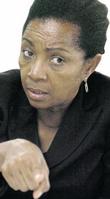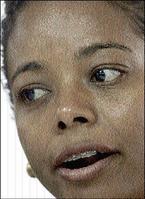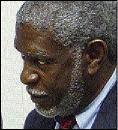Barbara Gayle, Staff Reporter


Left: Samuels-Brown: Chides Malahoo Forte for using the public media to "denigrate" the legal profession as a whole. Right: Malahoo Forte: I stand by what I said because this is what I see. Nobody wants to say it, but it is the truth.
- Andrew Smith/Photography Editor
LAWYERS FROM the private Bar have hit back at the president of the Resident Magistrates' Association, Marlene Malahoo Forte, who has described some of them as "hustlers".
In a statement yesterday, president of the Jamaican Bar Association, Jacqueline Samuels-Brown, chided Malahoo Forte for using the public media to "denigrate" the legal profession as a whole.
But Malahoo Forte is standing by her position. Yesterday, she even went further, saying the conduct of some lawyers was criminal.
"I see conduct so unbecoming that in other places, where the legal profession is properly regulated, they could not practise law," she told The Gleaner/Power 106 News Centre, adding that many complaints are before the General Legal Council.
Appropriate avenues
However, Samuels-Brown said while Malahoo Forte may have issues with lawyers from time to time, she should use the appropriate avenues for particular action to be taken.
Samuels-Brown said the bar association would be seeking to meet with Malahoo Forte and the relevant authorities to discuss the matter.
During a Gleaner Editors' Forum on Tuesday, Malahoo Forte blamed some lawyers for the wide-scale breakdown of the justice system.
"I think the legal profession has been relegated to a hustling," she said, arguing that some lawyers often booked more than two cases for the same period, ultimately creating delays in the system.
Yesterday, defence lawyer Valerie Neita-Robertson also castigated the Resident Magistrate, calling her biased. She said Malahoo Forte should show respect for the private bar.
"Let us not point fingers or grab headlines and instead seek to work together to achieve our objective of a justice system we can all trust and be proud of as Jamaicans," she said noting that recalcitrant attorneys should be dealt with.
Neita-Robertson said on Mondays, for example, lawyers often are ready for as many as four cases, while the Crown is totally unprepared to proceed.
Glen Cruickshank, QC, also took issue with Malahoo Forte. He said the backlog in the courts was not caused by lawyers having more than one case per day, but the failure of the police to properly investigate the cases. Cruickshank added that the prosecution's insistence to have the matter set down for trial even when they are not ready was contributing to the case pile up.
"No magistrate who is worth his or her salt would allow adjournment willy nilly at the behest of the defence counsel," he said.
In the meantime, Malahoo Forte said her comments at Tuesday's forum were not aimed at sparking controversy.
"We are afraid to face the truth. The system is sick. I stand by what I say because this is what I see. Nobody wants to say it, but it is the truth," she said.

Neita-Robertson
Cruickshank's proposals to cut court case backlog:
1. Abolish preliminary inquiries.
2. Strengthen witness protection programme.
3. Equip the forensic laboratory with whatever they require.
4. Do not swell the ranks of the force with unintelligent persons.

Cruickshank

